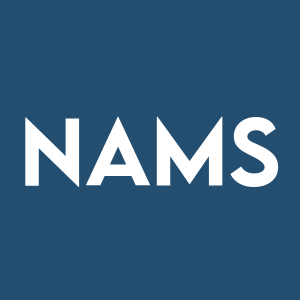NewAmsterdam Pharma Announces Positive Topline Data from Pivotal Phase 3 BROADWAY Clinical Trial Evaluating Obicetrapib in Patients with Atherosclerotic Cardiovascular Disease and/or Heterozygous Familial Hypercholesterolemia
Rhea-AI Summary
NewAmsterdam Pharma announced positive topline data from its Phase 3 BROADWAY clinical trial evaluating obicetrapib in patients with cardiovascular disease and heterozygous familial hypercholesterolemia. The trial achieved its primary endpoint with a statistically significant 33% reduction in LDL-C compared to placebo (p0.0001).Key findings include a 21% reduction in major adverse cardiovascular events favoring obicetrapib at one year. The drug demonstrated favorable safety results comparable to placebo, with treatment discontinuation rates of 11.1% for obicetrapib versus 12.4% for placebo. The trial involved 2,530 patients randomized 2:1 to receive 10mg obicetrapib or placebo daily for 52 weeks.
Positive
- Achieved primary endpoint with 33% LDL-C reduction vs placebo (p<0.0001)
- 21% reduction in major adverse cardiovascular events at one year
- Safety profile comparable to placebo with lower discontinuation rate (11.1% vs 12.4%)
- Consistent positive changes in other biomarkers (HDL-C, non-HDL-C, Lp(a), ApoB, ApoA1)
Negative
- None.
News Market Reaction
On the day this news was published, NAMS gained 41.41%, reflecting a significant positive market reaction.
Data tracked by StockTitan Argus on the day of publication.
-- Achieved primary endpoint of LS mean reduction vs placebo in LDL-C on top of maximally tolerated lipid modifying therapies at day 84 with statistically significant reduction (p<0.0001) --
--
-- Observed to be well-tolerated with safety results comparable to placebo --
-- NewAmsterdam to host conference call at 8:00 a.m. ET today --
NAARDEN, The Netherlands and MIAMI, Dec. 10, 2024 (GLOBE NEWSWIRE) -- NewAmsterdam Pharma Company N.V. (Nasdaq: NAMS or “NewAmsterdam” or the “Company”), a late-stage, clinical biopharmaceutical company developing oral, non-statin medicines for patients at risk of cardiovascular disease (“CVD”) with elevated low-density lipoprotein cholesterol (“LDL-C”), for whom existing therapies are not sufficiently effective or well-tolerated, today announced positive topline data from the Company’s Phase 3 BROADWAY clinical trial (NCT05142722) evaluating obicetrapib in adult patients with established atherosclerotic cardiovascular disease (“ASCVD”) and/or heterozygous familial hypercholesterolemia (“HeFH”), whose LDL-C is not adequately controlled, despite being on maximally tolerated lipid-lowering therapy.
“We initiated four Phase 3 trials with obicetrapib in December 2021, with the hope that obicetrapib would become the therapeutic option of choice to add to statin therapy to further reduce cardiovascular (“CV”) risk,” said Michael Davidson, M.D., Chief Executive Officer of NewAmsterdam. “Our aspiration was that our Phase 3 trials would not only confirm the efficacy and tolerability observed in Phase 2 but also clearly demonstrate a safety and clinical profile that would differentiate obicetrapib from other LDL-C lowering therapies. We are proud to have observed in our Phase 3 trials to date not only durable LDL-C reduction in both the monotherapy obicetrapib group and the obicetrapib combination with ezetimibe group, but also a safety and tolerability profile that exceeded our expectations. We have observed obicetrapib, an oral, once-a-day, low-dose tablet, to be clinically differentiated from other lipid lowering therapies by lowering Lp(a) and small LDL-particles as well as potentially improving glycemic measures that are linked to high CV risk. Although exploratory at this point, the difference in major adverse cardiovascular events (“MACE”) at one year in BROADWAY supports our belief that obicetrapib could provide greater than expected CV risk reductions through mechanisms beyond LDL-C lowering. In 2025, we look forward to presenting additional BROADWAY and TANDEM data at upcoming scientific sessions and meeting with regulatory authorities to discuss filings for this important therapy to address the global unmet need for effective LDL-C lowering therapies.”
The primary endpoint was the least-squares mean of the percent change in LDL-C from baseline to day 84 for obicetrapib 10 mg compared to placebo, using imputation for missing data. The primary endpoint was achieved with statistical significance with an LDL-C reduction of
LDL-C percentage change at day 84:
| Placebo (n = 844) | Obicetrapib 10 mg (n = 1686) | Difference | ||||
| Mean | - | - | -33% | |||
| Median | - | - | -36% | |||
| LS mean (with imputation) | + | - | -33% | |||
As part of the safety analysis, the trial adjudicated MACE, including death, non-fatal myocardial infarction, non-fatal stroke and coronary revascularization. In addition, a
Major adverse cardiovascular events table:
| Placebo (n = 844) | Obicetrapib 10 mg (n= 1686) | Hazard Ratio | ||
| All-cause mortality – no. (%) | 12 (1.4) | 19 (1.1) | 0.83 | (0.40-1.71) |
| Coronary heart death – no. (%) | 5 (0.6) | 8 (0.5) | 0.80 | (0.26-2.44) |
| First 4-point MACE – no. (%) | 44 (5.2) | 70 (4.2) | 0.79 | (0.54-1.15) |
4-point MACE: CHD death, non-fatal myocardial infarction, non-fatal stroke, coronary revascularization. MACE was not a primary or secondary endpoint of the BROADWAY trial.
“I have provided leadership to cardiovascular drug development since the early statin days and was thrilled to see a safety profile as clean as obicetrapib, which has been comparable to placebo. Having lived and witnessed the accumulation of efficacy and safety data for obicetrapib from early Phase 1 through Phase 3, this moment is an exciting milestone,” said John Kastelein, M.D., Ph.D., FESC, Chief Scientific Officer of NewAmsterdam. “The unexpected magnitude of difference in MACE and early separation in the Kaplan-Meier curves that we observed may indicate obicetrapib’s potential benefit above LDL-C lowering alone. MACE risk is multifaceted and obicetrapib has shown consistent benefit in our clinical trials across a variety of drivers but ultimately, getting patients’ LDL-C to target is what I care about. I am optimistic that obicetrapib monotherapy and in combination with ezetimibe each could help most patients reach these goals, if approved.”
The observed changes in other biomarkers, including high-density lipoprotein cholesterol (“HDL-C”), non-HDL-C, lipoprotein(a) (“Lp(a)”), apolipoprotein B (“ApoB”), and Apolipoprotein A1 (ApoA1) were consistent with data reported in the Company’s prior clinical trials.
As part of the safety analysis, key adverse events (“AE”) of special interests were monitored. Among these AEs, glycemic control and renal function were monitored and each of the events favored obicetrapib. Overall, obicetrapib was also observed to be well-tolerated, with safety results, including blood pressure, comparable to placebo. The treatment discontinuation rate for the obicetrapib arm was
| | Placebo N=843 n (%) | Obicetrapib 10 mg N=1,685 n (%) |
| Any TEAEs | 513 (60.9) | 1007 (59.8) |
| Any trial drug related TEAEs | 39 (4.6) | 76 (4.5) |
| Any TEAEs leading to discontinuation of trial drug | 43 (5.1) | 68 (4.0) |
| Any TESAEs | 117 (13.9) | 211 (12.5) |
“Despite the widespread availability of lipid-lowering therapies, patients are still struggling to achieve target LDL-C levels and CVD-related death rates continue to rise,” said Stephen Nicholls, M.B.B.S., Ph.D., Director, Monash Victorian Heart Institute and Professor of Cardiology, Monash University. “The BROADWAY clinical trial highlights the transformative potential of obicetrapib — a powerful, well-tolerated, and convenient treatment option for millions with dyslipidemia, if approved, could help them reach their LDL-C goals and significantly reduce the risk of life-threatening cardiovascular events.”
NewAmsterdam plans to present additional results from BROADWAY at an upcoming medical conference and to publish the data in a major medical journal.
Design of the Pivotal Phase 3 BROADWAY Clinical Trial
The 52-week, global, pivotal, Phase 3, randomized, double-blind, placebo-controlled multicenter trial evaluated the efficacy and safety of 10 mg obicetrapib compared to placebo as an adjunct to maximally tolerated lipid-lowering therapies in patients with ASCVD and/or HeFH whose LDL-C is not adequately controlled. The trial was conducted at sites in North America, Europe, Asia and Australia. A total of 2,530 patients were randomized 2:1 to receive 10 mg obicetrapib or placebo dosed as a once-daily oral treatment, with or without food for 52 weeks. The mean baseline LDL-C for enrolled patients in the obicetrapib arm was approximately 100 mg/dL despite high intensity statin use reported by nearly
The primary endpoint was LS mean percent change from baseline in LDL-C of obicetrapib 10 mg compared to placebo after 84 days which showed a reduction of
Conference Call and Webcast Information
NewAmsterdam will host a live webcast and conference call to review the topline results from BROADWAY at 8:00 a.m. ET today. To access the live webcast, participants may register here. The live webcast will be available under the "Events” section of the Investor Relations page of the NewAmsterdam website at ir.newamsterdampharma.com.
To participate via telephone, please register in advance here. Upon registration, all telephone participants will receive a confirmation email detailing how to join the conference call, including the dial-in number along with a unique passcode and registrant ID that can be used to access the call. While not required, it is recommended that participants join the call ten minutes prior to the scheduled start. An archived replay of the webcast will be available on NewAmsterdam’s website.
About NewAmsterdam’s Global Pivotal Phase 3 Program
NewAmsterdam’s global, pivotal Phase 3 clinical development program consists of four trials in over 12,250 patients, three for obicetrapib monotherapy and one for a fixed-dose combination (“FDC”) of obicetrapib and ezetimibe:
- BROOKLYN evaluated obicetrapib in patients with HeFH, whose LDL-C is not adequately controlled despite being on maximally tolerated lipid-lowering therapy. NewAmsterdam reported topline data in the third quarter of 2024 and presented additional data at the American Heart Association Scientific Sessions 2024 in November.
- TANDEM evaluated obicetrapib as part of a FDC tablet with ezetimibe, a non-statin oral LDL-lowering therapy, in patients with established atherosclerotic cardiovascular disease (“ASCVD”) or multiple risk factors for ASCVD and/or HeFH, whose LDL-C is not adequately controlled despite being on maximally tolerated lipid-lowering therapy. NewAmsterdam reported topline data in November 2024.
- BROADWAY evaluated obicetrapib in adult patients with established ASCVD and/or HeFH, whose LDL-C is not adequately controlled despite being on maximally tolerated lipid-lowering therapy. NewAmsterdam completed enrollment of over 2,500 patients in July 2023 and reported topline data in the fourth quarter of 2024.
- PREVAIL is a cardiovascular outcomes trial evaluating obicetrapib in patients with a history of ASCVD, whose LDL-C is not adequately controlled despite being on maximally tolerated lipid-lowering therapy. NewAmsterdam completed enrollment of over 9,500 patients in April 2024.
About Obicetrapib
Obicetrapib is a novel, oral, low-dose CETP inhibitor that NewAmsterdam is developing to overcome the limitations of current LDL-lowering treatments. In each of the Company’s Phase 2 trials, ROSE2, TULIP, ROSE, and OCEAN, as well as the Company’s Phase 3 BROOKLYN, BROADWAY and TANDEM trials, evaluating obicetrapib as monotherapy or combination therapy, the Company observed statistically significant LDL-lowering combined with a side effect profile similar to that of placebo. The Company is currently conducting the Phase 3 PREVAIL cardiovascular outcomes trial in March 2022, which is designed to assess the potential of obicetrapib to reduce occurrences of major adverse cardiovascular events, including cardiovascular death, non-fatal myocardial infarction, non-fatal stroke and non-elective coronary revascularization. NewAmsterdam completed enrollment of PREVAIL in April 2024 and randomized over 9,500 patients. Commercialization rights of obicetrapib in Europe, either as a monotherapy or as part of a fixed dose combination with ezetimibe, for cardiovascular diseases have been exclusively granted to the Menarini Group, an Italy-based, leading international pharmaceutical and diagnostics company.
About Cardiovascular Disease
Cardiovascular disease (CVD) remains the leading cause of death globally, despite the availability of lipid-lowering therapies (LLTs). By 2050 more than 184 million US adults are expected to be affected by CVD and hypertension, including 27 million with coronary heart disease and 19 million with stroke. In the US from 2019 through 2022, CVD age-adjusted mortality rates increased
About NewAmsterdam
NewAmsterdam Pharma (Nasdaq: NAMS) is a late-stage biopharmaceutical company whose mission is to improve patient care in populations with metabolic diseases where currently approved therapies have not been adequate or well tolerated. We seek to fill a significant unmet need for a safe, well-tolerated and convenient LDL-lowering therapy. In multiple phase 3 trials, NewAmsterdam is investigating obicetrapib, an oral, low-dose and once-daily CETP inhibitor, alone or as a fixed-dose combination with ezetimibe, as LDL-C lowering therapies to be used as an adjunct to statin therapy for patients at risk of CVD with elevated LDL-C, for whom existing therapies are not sufficiently effective or well tolerated.
Forward-Looking Statements
Certain statements included in this document that are not historical facts are forward-looking statements for purposes of the safe harbor provisions under the United States Private Securities Litigation Reform Act of 1995. Forward-looking statements generally are accompanied by words such as “believe,” “may,” “will,” “estimate,” “continue,” “anticipate,” “intend,” “expect,” “should,” “would,” “plan,” “predict,” “potential,” “seem,” “seek,” “future,” “outlook” and similar expressions that predict or indicate future events or trends or that are not statements of historical matters. These forward-looking statements include, but are not limited to, statements regarding the Company’s business and strategic plans, the Company’s commercial opportunity, the therapeutic and curative potential of the Company’s product candidate, the Company’s clinical trials and the timing for enrolling patients, the timing and forums for announcing data, the achievement and timing of regulatory approvals, and plans for commercialization. These statements are based on various assumptions, whether or not identified in this document, and on the current expectations of the Company’s management and are not predictions of actual performance. These forward-looking statements are provided for illustrative purposes only and are not intended to serve as and must not be relied on as a guarantee, an assurance, a prediction, or a definitive statement of fact or probability. Actual events and circumstances are difficult or impossible to predict and may differ from assumptions. Many actual events and circumstances are beyond the control of the Company. These forward-looking statements are subject to a number of risks and uncertainties, including changes in domestic and foreign business, market, financial, political, and legal conditions; risks related to the approval of the Company’s product candidate and the timing of expected regulatory and business milestones, including potential commercialization; whether topline, initial or preliminary results from a particular clinical trial will be predictive of the final results of that trial and whether results of early clinical trials will be indicative of the results of later clinical trials, or whether projections regarding clinical outcomes will reflect actual results in future clinical trials or clinical use of our product candidate, if approved; ability to negotiate definitive contractual arrangements with potential customers; the impact of competitive product candidates; ability to obtain sufficient supply of materials; global economic and political conditions, including the Russia-Ukraine and Israel-Hamas conflict; the effects of competition on the Company’s future business; and those factors described in the Company’s public filings with the Securities Exchange Commission. Additional risks related to the Company’s business include, but are not limited to: uncertainty regarding outcomes of the Company’s ongoing clinical trials, particularly as they relate to regulatory review and potential approval for its product candidate; risks associated with the Company’s efforts to commercialize a product candidate; the Company’s ability to negotiate and enter into definitive agreements on favorable terms, if at all; the impact of competing product candidates on the Company’s business; intellectual property related claims; the Company’s ability to attract and retain qualified personnel; ability to continue to source the raw materials for its product candidate. If any of these risks materialize or the Company’s assumptions prove incorrect, actual results could differ materially from the results implied by these forward-looking statements. There may be additional risks that the Company does not presently know or that the Company currently believes are immaterial that could also cause actual results to differ from those contained in the forward-looking statements. In addition, forward-looking statements reflect the Company’s expectations, plans, or forecasts of future events and views as of the date of this document and are qualified in their entirety by reference to the cautionary statements herein. The Company anticipates that subsequent events and developments may cause the Company’s assessments to change. These forward-looking statements should not be relied upon as representing the Company’s assessment as of any date subsequent to the date of this communication. Accordingly, undue reliance should not be placed upon the forward-looking statements. Neither the Company nor any of its affiliates undertakes any obligation to update these forward-looking statements, except as may be required by law.
Company Contact
Matthew Philippe
P: 1-917-882-7512
matthew.philippe@newamsterdampharma.com
Media Contact
Spectrum Science on behalf of NewAmsterdam
Bryan Blatstein
P: 1-917-714-2609
bblatstein@spectrumscience.com
Investor Contact
Precision AQ on behalf of NewAmsterdam
Austin Murtagh
P: 1-212-698-8696
austin.murtagh@precisionaq.com








